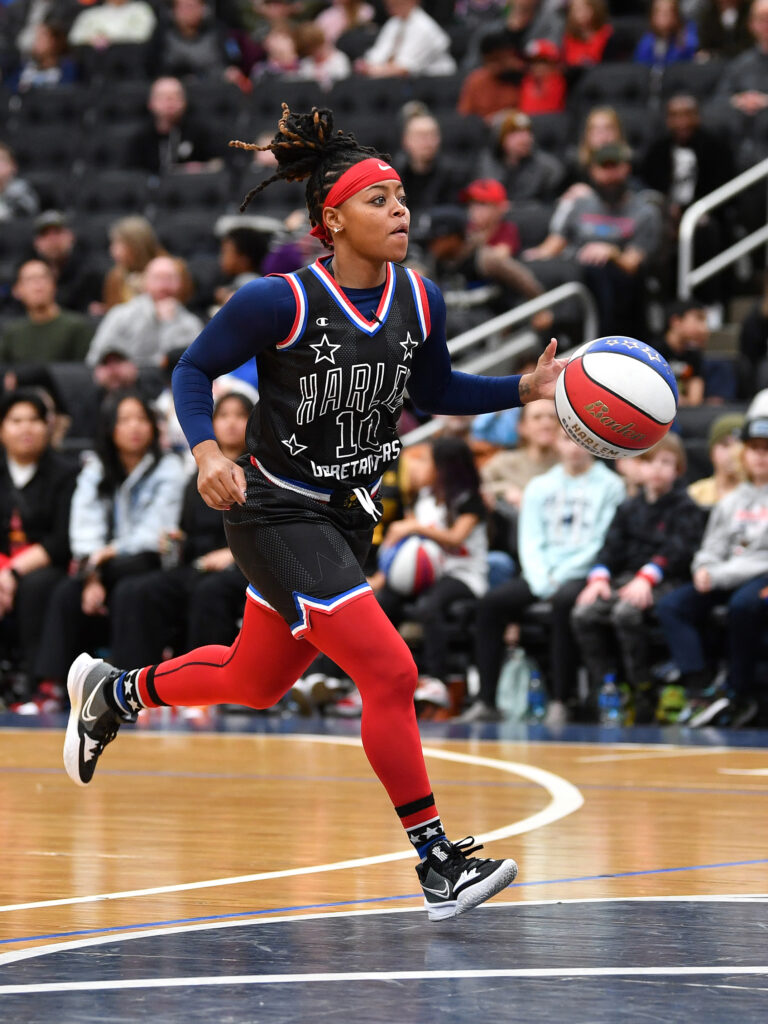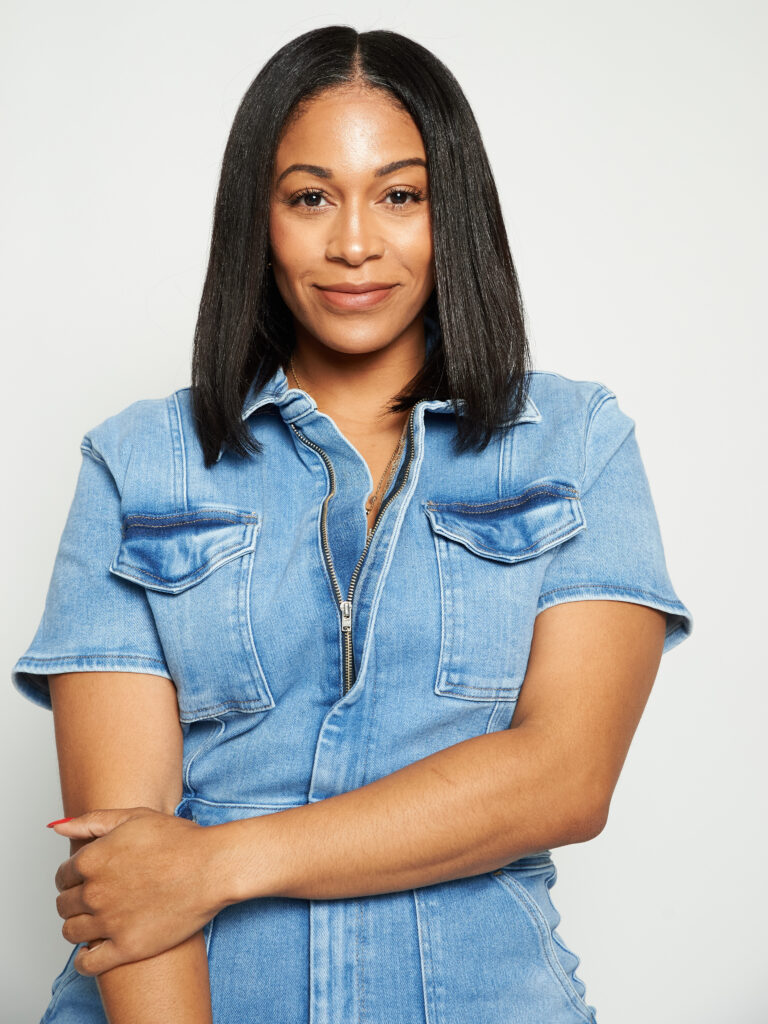Once you’re told you have a chronic condition or autoimmune disease, that illness stays with you for the rest of your life.
Nearly half of the U.S. population (45%) has at least one chronic disease, according to The National Institute of Health. Reports also state that out of 50 million Americans living with an autoimmune disease, 75% are women, according to Autoimmune.org. Getting a diagnosis like that comes with complicated decision-making about your future and how to manage your symptoms.
For the three women below, a poor quality of life wasn’t an option. Below, they share their stories: How they were able to accept their diagnosis and, eventually, channel it to inspire others.
Food was her medicine
Cherelle “Torch” George is one of the dynamic players of the Harlem Globetrotters. In her sixth season, she is the first and only Globetrotter to have two Guinness World Records. But before she was breaking records, George was fighting a battle with hyperthyroidism.
Her diagnosis came during an already stressful time: In 2010, at 25, George was cut in the final round to make the roster of the Indiana Fever. A few months later, her mother passed away, and George was responsible for being a source of strength for her two siblings. “I remember thinking life would never be the same,” says George.
During her mother’s funeral services, George’s aunt noticed her neck had a bulging appearance and suggested that George see an endocrinologist for a possible thyroid issue. “I got some blood work done, and my thyroid levels were 10 times the limit,” says George. “I had lost 20 pounds in those two weeks and didn’t even realize it.”
When her official diagnosis came in, George was told she could not continue to play basketball with the diagnosis of hyperthyroidism. She was also given medication to help treat her symptoms but fell into depression when she gained weight. That was the impetus for her deep dive into natural ways to treat her condition. She switched to an all-vegan diet and learned about the benefits of natural herbs. She started to feel better about herself and more hopeful that she could keep her symptoms at bay. “My dreads began to grow, and they grew thick,” says George. “They symbolized strength—like, you’re okay. You’re doing okay.”

In 2012, George moved to Miami for a fresh start. She started her youth basketball training business there while seeing holistic doctors. In 2014, George sent her last lab work in to find out she was free of hyperthyroidism. She was ready to hit the court again and joined the Lady Bulls of Miami.
George’s business was thriving, her body felt better than ever and she was doing what she loved. During a youth basketball tournament, George was scouted by a former Harlem Globetrotter referee that watched her dribble and shoot the ball between games. The referee suggested George try out and submit her tape. Within a week, she was asked to fly to Georgia to audition, and the rest is history.
Six years later, she is still traveling the world with her team and living the life she dreamed of. She maintains the same lifestyle and diet that helped her overcome hyperthyroidism. “Nothing’s changing because I don’t want to go back,” she says. “I feel like I’m aging backwards.”

Merging two passions
Ayanna Sealey, 46, is an Alvin Ailey-trained dancer and mental performance coach who helps executives and athletes achieve peak career performance.
In her first semester at Alvin Ailey, she was diagnosed with lymphedema, a swelling that generally occurs in the legs and feet. It started with her noticing the imprint of her laces on her feet. “I think the amount of dancing that I was doing brought it on full throttle,” says Sealey.
She learned to manage her symptoms by wearing support stockings and elevating her feet when she sleeps, but there are no medications to stop the swelling. Sealey also started to pay closer attention to what she ate. “Diet has a huge impact on your lymphedema because, remember, too much sodium and there’s water retention, which is not good for a person with lymphedema,” says Sealey. “Even sugar, which is highly inflammatory, impacts someone whose body cannot flush that out as readily.”
The full day of dancing that could run eight to nine hours started to become too much for her body. Since she was a modern dancer, most of her routines were barefoot. “We’d be turning and jumping and bare feet, and then you get little cuts on the bottoms of your feet,” says Sealey. “People with lymphedema are more susceptible to infection.” Despite the symptoms, Sealey continued training until she grew tired of getting infections.
“I was miserable,” she says. “All I wanted to do was be on stage.” Unwilling to give up, she began the process of finding an agent who could help her audition for roles more compatible with her health condition. She never booked anything using her bare feet. Even when she was booked to dance in The Lion King Broadway production, which required dancing in bare feet, the team accommodated Sealy’s lymphedema to ensure she was taken care of.
The experience fueled her decision to return to school for psychology, specializing in performance psychology, with the goal of imparting her personal experiences to help professionals actualize their own potential. She advises performers who are navigating new medical diagnoses to have support and community. “Find someone that you can offload on because you don’t want it to become burdensome to the point where it’s debilitating for when you’re performing,” she says. “Find someone who’s been trained and can really be of service to you and hold space for what you need.”
A life without regrets
When Victoria Reese moved to Los Angeles at 25 years old to pursue a career in talent management, she was diagnosed with multiple sclerosis (MS).
It started with her feeling numbness and tingling in her legs as well as having sleepless nights. Her doctor thought it was just symptoms of handling the pressures of work after an MRI of her legs didn’t reveal anything.
When an “excruciating migraine” joined the list of her symptoms, she went back and had a brain scan. That led to an official MS diagnosis.
“I questioned everything,” says Reese. “I felt like I lost my plan and my vision for my life. I immediately started that grieving process of feeling like my whole life is over.”
The day her leg went numb in the parking lot and she had to crawl to her car, she knew she had to make some lifestyle changes. “I ultimately left my job because stress is a huge trigger for flare-ups and relapses,” she says.
But she wasn’t ready to give up on her aspirations. “[I thought], ‘I’m going to finish what I started,” says Reese. “I still want to get these things out of my system, these dreams and visions.”

Instead of returning to corporate America, Reese went the entrepreneurial route. She founded Victor Group Creative, a branded marketing consultancy, and a non-profit organization, We Are ILL, to create a space for Millennial Black women living with MS to feel seen and heard. “We redefine what MS looks like,” says Reese. “MS is known as a white woman’s disease, but it disproportionately affects Black women.”
It’s been 10 years since her diagnosis. Since then, Reese has become a mom, moved to Atlanta, became a homeowner and is planning her wedding. She admits she hasn’t found the secret to balancing her health and entrepreneurship, but she’s figuring it out. “I’m tough,” she says. “I’m like Ford tough.”
That toughness doesn’t eliminate her desire for a soft life. Reese knows that the grinding and hustle of her twenties must change to make accommodations for the life she wants next. “I’m trying to carve out and create a life that fosters a safe space for the reality of my life [with an illness].”
Treatment and appointments can be expensive, and having a chronic disease often needs a holistic approach to care. “That means building the right ecosystem of a healthcare team,” says Reese. “The roster of people who help me live my best life.” That team includes a therapist, personal trainer, physical wellness expert and chiropractor.
Reese hopes her life story will be the “how” that somebody else can learn from. If you are living with a chronic illness, Reese wants to remind you to be flexible when identifying what this “how” looks like for you and your condition. “The moment you stop resisting, suffering ends,” she says.







